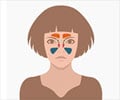Researchers from Harvard Medical School is presenting a paper at the 109th Annual Meeting & OTO EXPO of the American Academy of Otolaryngology being held September 25-28, 2005 on the impact of age on sinusitis symptoms.
This study had involved 514 adult patients with inflammatory paranasal sinus disease at a single tertiary care facility. The term inflammatory paranasal sinus disease is used to encompass CRS, CRS with polyposis, recurrent acute rhinosinusitis, barosinusitis, mucoceles or mucopyoceles, and antral-choanal polyp. The patients were divided into three groups based on their age at presentation.Results: A total of 514 adult patients (273 women and 241 men) were evaluated in this study. The mean age was 45.5 years old (range: 18-86 years). Group 1 consisted of 203 patients (112 females and 91 males), group 2 consisted of 213 patients (107 females and 106 males), and group 3 consisted of 98 patients (54 females and 44 males). Among the presenting symptoms, facial pain and rhinorrhea (nasal discharge) were most common among the age group 1 (of 18 and 39 years) and least common among group 3 were (of ages above 60 years ) patients, while dysosmia (altered sense of smell) was most common among group 3 patients. Environmental allergy, but not asthma, was more prevalent in groups 1 and 2 (of age 40 and 59 years) compared to group 3.
The clinical presentation of inflammatory paranasal sinus disease varies with age. The younger patients are more likely to complain of facial pain or headache, have allergic rhinitis, and have anatomic obstruction of the OMU. The older patients report more dysosmia on presentation and are more likely to have nasal polyposis.
The vast majority of the patients in the study and in all age groups reported improvement in all the presenting symptoms following surgery; however, olfactory function is more likely to improve in the younger patients, while nasal drainage is more likely to improve in the older patients.
Source: Newswise






